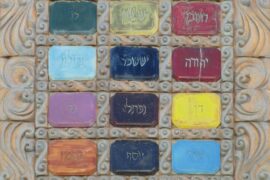We are taught “B’khol dor v’dor ḥayav adam lir’ot et atzmo k’ilu hu yatza miMitzrayim – In each and every generation, a person is obligated to see himself as if he had left Egypt” (P’saḥim 116b).
This Talmudic statement, referring to the Biblical Exodus of B’nei Yisrael from Egypt and recited as part of the Pesaḥ seder each year, in many ways encapsulates the nature of traditional Jewish historiography and the way countless generations of Jews have related to their collective past.
From a standard historical perspective, yetziat Mitzrayim happened once, millennia ago, and only then. But for Am Yisrael, it is a constant reality – we are expected to live our lives as if we personally were slaves, freed from Egypt to serve HaShem. Every generation is meant to express the sentiment in Sh’mot 13:8: “On account of this, HaShem acted for me as I left Egypt.”
The power of this commandment is greater in light of its accompanying pronouncements throughout the Torah: “and you shall love the stranger among you…” “do not oppress the stranger in your midst…” “the stranger who lives among you shall be like a citizen…” “…for you were strangers in the land of Egypt.”
The compassion with which Jews must treat strangers can only be deepened by approaching the world as if we ourselves were once strangers, enslaved in a strange land.
This attempt to transcend conventional understandings of space and time is not just some arbitrary exercise in make-believe. It is an attempt to truly humble oneself, in order to better serve HaShem and, by extension, to more readily show compassion to those on the margins of society.
But there is another level of understanding even more in tune with Jewish historiographic trends. In our history, since national identities are primordial and derive from the seventy nations descended from Noaḥ, each Biblical nation represents a timeless force in history.
Since we cannot all have literally been enslaved in Egypt and redeemed from there through miracles, Mitzrayim can be understood as more than literal bondage at the hands of Pharaoh.
As various Kabbalists and Ḥasidic masters have explained over the centuries, Mitzrayim, the place and the people, are symbolic of narrowness – tzarut – so to emerge from narrowness is “yetziat mitzarim,” indistinguishable from “Mitzrayim” without vowels.
But what is narrowness? How can narrowness enslave us? And how does HaShem remove us from this “slavery” in every generation in order to serve Him?
The narrowness is the barriers that limit and mediate our experience of the world, the klipot. The Kedushat Levi identifies Mitzrayim as the source of klipot in his commentary on Parshat Vayigash. He also views the adoption of Egyptian culture as a deeper spiritual component of the descent into Egypt.
These klipot, these mediating forces that inhibit our ability to connect with the truth of the world and its people, are the essence of enslavement in Egypt which each and every person experiences today. While B’nei Yisrael are no longer literally slaves, in Egypt or elsewhere, Jew are subject to the cultures in which they live, which often demand conformity to the local ways of life and world views as conditions for acceptance.
This “emancipation” from separateness is therefore, from a Jewish perspective, actually the essence of enslavement.
Yet today, most Jews around the world remain subject to these inorganic mediating forces. When these klipot get in the way of our relationship with HaShem, we are enslaved to them and unable to properly connect to Him. But we also have it within ourselves to be freed from bondage.
Just as B’nei Yisrael were given the Torah upon being liberated from Egypt, the Torah continues to serve us as a guide for true freedom – by following our traditions, our national way of life, in service of HaShem, rather than living in the narrowness of our “emancipated” host cultures, we can live as if we ourselves had left Mitzrayim and achieved liberation.





